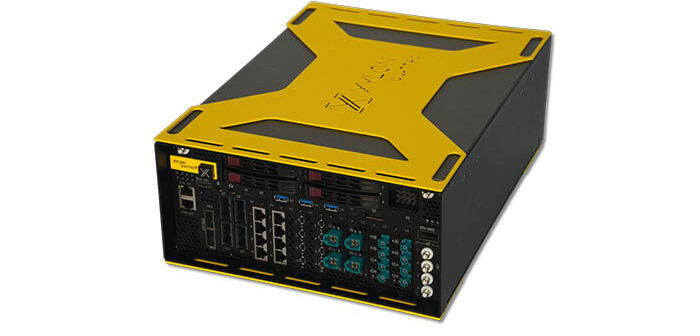A fourth-generation data logging and HIL system for development, testing and validation of autonomous driving (AD) and vision-based advanced driver assistance systems (ADAS), called Xylon Quattro, has been unveiled by Xylon.
Benefitting from an extensive and futureproof feature set, Xylon Quattro is capable of supporting automotive developments up to L5 autonomy and complements the existing third-generation logiRECORDER data logger which will be maintained and upgraded for use in performance and cost-optimized automotive developments.
Xylon Quattro features 128Gbps of data logging and playback bandwidth, up to 128TB of internal data storage and automotive interfacing. The testing solution enables direct connections of up to 16 video cameras, with resolutions up to 32MP, via current LVDS interfaces, including GMSL2 from Analog Devices or FPD-Link III from Texas Instruments. Additionally, Xylon Quattro is backward compatible with the existing logiRECORDER video I/O modules, providing support for different video interfaces.
Other advantages of the system include the ability to directly interconnect up to 16 lidar and radar sensors (and other automotive systems) to 16 10M/100M/1G/2.5G/10G ethernet (BASE-T) and automotive ethernet (BASE-T1) channels. Four-channel ethernet modules can also be configured into fast, HW-based two-channel TAP configuration, negating the need for costly external Ethernet switches.
Xylon Quattro is also capable of directly interfacing (without external converter boxes) more than 20 low- and- mid-speed automotive interfaces, including differing versions of CAN, LIN, UART and FlexRay networks.
“We consulted with practically all Tier 1s and OEMs, as well as with many technology and AI companies, on their current and future needs,” said Davor Kovacec, founder and CEO, Xylon. “Taking everything into consideration, we were able to create a universal, multifunctional device capable of fulfilling all test tasks in the years to come. The new and open SW architecture paired with configurable HW enables customers to tailor tests to virtually any user case.”
A key difference between Xylon Quattro and other systems is the company’s programmable hardware engine configurable at the FPGA chip level. The bespoke hardware enables data processing out of reach to software or common hardware-based processing engines, including real-time insertion of a live video camera’s metadata into synthetically generated camera data for HIL testing of an ECU under test that runs the production firmware mode.
For additional flexibility, Xylon has expanded the HW engine with a complete x86-based PC to provide new possibilities in data logging and HIL playback, AI triggering and filtering and automated scripted testing. Xylon invested significantly into an open software architecture to enable user customizations and modularity. This includes emulation of high-speed sensors and support for existing and emerging protocols and services management.
When utilized in HIL setups, the company’s systems work as smart I/O boxes which convert synthetic data from multiple and heterogeneous vehicle sensors modeled within the simulation platform into physical automotive interfaces connected to real ECU and domain controllers under test. This real-time interface between the synthetic and real world works in both directions and enables full virtual test drives. Compared to the third-generation data logger which features a single 10 GbE HIL port, the fourth generation Xylon Quattro now integrates two 100 GbE HIL ports to enable the most complex simulations like ECU perception algorithms checkup based on simulated high-resolution camera and lidar inputs.
The company aims to begin shipping its latest system to certain customers by the end of Q2 2023, with full production planned for Q3 of 2023.


